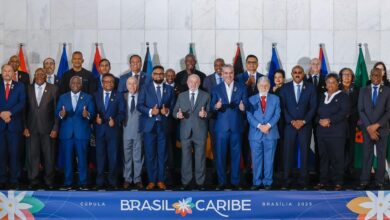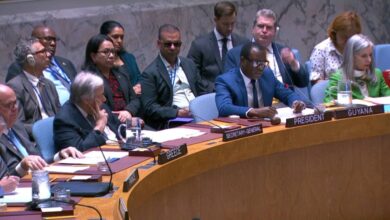“In an effort to provide constructive solutions, we believe there is room for CARICOM Regional Institutions, sensitive to the regional and national capabilities of CARICOM Member States and capable of providing clear direction, guidance, and timely feedback to the CBD and the GEF national focal points’ organisations, particularly those with limited manpower, to plan and implement the NBSAP-related projects and be accredited to the GEF to implement projects and programmes. Considering this, we request that the Caribbean Development Bank consider being accredited to the Global Environment Facility.”
The Member States of the Caribbean Community (CARICOM) have been engaged in an extensive international environment agenda which will evolve with key decision-making on Biodiversity, Climate Change, Land Degradation and Plastics. While the negotiating agenda remains challenging for our limited national capacities, we remain committed given the clear and present danger that inaction in these spheres pose to the livelihoods of current and future generations of citizens of the Caribbean Community.
Biodiversity COP 16
CARICOM Member States are deeply committed to the implementation of the Global Biodiversity Framework (GBF) as well as monitoring and reporting on its implementation. To this end, Member States are committed to updating and aligning National Biodiversity Strategies and Action Plans (NBSAPS) to the Global Biodiversity Framework. We also place priority on the completion of finance strategies to accurately cost activities but note that these are dependent on the successful completion of the NBSAPs.
However, the Community, remains concerned about the slow pace of the NBSAP update and alignment processes due to challenges encountered with procurement processes outside the control of the Member States. While Member States appreciate the support provided, it is critical that administrative processes be expedited to ensure that more valuable time is not lost.
In an effort to provide constructive solutions, we believe there is room for CARICOM Regional Institutions, sensitive to the regional and national capabilities of CARICOM Member States and capable of providing clear direction, guidance, and timely feedback to the CBD and the GEF national focal points’ organisations, particularly those with limited manpower, to plan and implement the NBSAP-related projects and be accredited to the GEF to implement projects and programmes. Considering this, we request that the Caribbean Development Bank consider being accredited to the Global Environment Facility.
As a Community, we have observed that for effective implementation of Global Biodiversity Goals, there must be closer synergies with other Multilateral Environmental Agreements (MEAs) including the United Nations Framework Convention on Climate Change (UNFCCC), the United Nations Convention to Combat Desertification (UNCCD) and the Basel, Rotterdam, Stockholm and Minamata (BRSM) Conventions. The time for developing actions to advance synergistic implementation is now, especially considering limited human and financial capacity for implementation.
We recognise the need to strengthen the Region’s capacity in biodiversity by, among other things, enhancing training and local expertise; developing research infrastructure; and strengthening regional institutions dedicated to biodiversity
We therefore welcome the nomination of the CARICOM Secretariat to serve as a host sub regional Technical and Scientific Cooperation Centre (TSC) under the Convention of Biological Diversity to support the implementation of the Global Biodiversity Framework and continue its efforts to support Member States to elevate the importance of biodiversity management. In this regard, we call on regional and international partners to support the CARICOM Secretariat in progressing the work of the TSC.
The issues of Invasive Alien Species, Marine and Coastal ecosystems, the 30 x 30 target, Digital Sequence Information and its linkage to Access and Benefits sharing and restoring degrading ecosystems, are all shared concerns for our Region. These issues are underpinned by the need for increased public awareness and strengthening data and information systems. There are also issues that speak directly to our vulnerabilities such as post-disaster recovery and the need to restore critical island ecosystems such as tropical and mangrove forests, as well as sustainable resource management in extractive industries such as mining and forestry and how these help with the fight against the impacts of global climate change.
For these reasons, this Community remains hopeful, but realistic, regarding implementation of the GBF. Despite our inherent vulnerabilities and fiscal challenges, we continue to be ambitious and innovative. We look forward to working with parties, civil society and international development partners, to make positive changes for planet and people.
Climate Change COP 29
The climate change crisis is not abating. Our Region remains in the direct path of impacts from extreme weather events to slow onset events, all of which threaten our people, their livelihoods, our economies, and our environment. Continued global inaction will result in an overshoot of 1.5 degrees Celsius in this decade. The consequences will be devastating for island economies dependent on agriculture, fishing and tourism as evidenced following the passage of Hurricane Beryl through our Region, and the significant impacts of ocean acidification on marine ecosystems and marine biodiversity.
Following the outcomes of the First Global Stocktake of the Paris Agreement goals, the COP 28 United Arab Emirates (UAE) Consensus was endorsed to put the world on track to achieve the 1.5 degrees Celsius temperature goal and to protect the most vulnerable via an energy transition package, a global resilience framework, and the newly operationalised loss and damage fund.
CARICOM is committed to the full implementation of the UAE Consensus. We expect that the Baku Climate Change Conference (COP 29) will build on the Consensus, deliver on the climate finance goal for its implementation, and safeguard the interests of Small Island Developing States (SIDS) and Least Developed Countries (LDCs).
There must be sustained efforts for the conservation, protection and restoration of forests, nature and ecosystems in general to achieve the 1.5 degrees Celsius temperature goal, including through enhanced efforts directed towards (i) halting and reversing deforestation and forest degradation by 2030, (ii) other terrestrial and marine ecosystems acting as sinks and reservoirs of greenhouse gases, and (iii) biodiversity. Carbon markets and other financing mechanism are crucial to resourcing these efforts.
CARICOM emphasises that implementation of the UAE Consensus is urgent. The transition away from fossil fuels is fundamental to keeping global warming below 1.5 degrees Celsius. We encourage all Parties to the Paris Agreement to contribute to this global effort by implementing current nationally determined contributions (NDCs) and elaborating their next NDCs due in February 2025. We call particularly on the Group of 20, who are responsible for 80 percent of global emissions, to bring forward 1.5 aligned NDCs as soon as possible. Our future is dependent on your action and ambition.
CARICOM is actively engaged across the climate agenda to ensure that the processes and institutions of the climate regime are fit for purpose for SIDS because of our unique circumstances. As Parties flesh out the process for follow-up to the global goal on adaptation, the mitigation work programme and the just transition work programme, as well as the Global Stocktake itself, CARICOM asks that these be responsive to SIDS.
While just transition has traditionally emphasised the transition of workforce from fossil fuel industries, the transition of people in our countries from their traditional livelihoods because of climate change impacts is less understood but no less important and critical now. SIDS must be a central part of the conversation and the solutions. CARICOM insists that no SIDS shall be left behind.
We welcomed the commitment made at COP26 to double climate adaptation financing by 2025 and emphasise the importance of its swift materialisation and operationalisation, and also call for monitoring and accountability mechanisms to ensure this goal is achieved.
Our Region’s ongoing challenges in the loss and damage space is unprecedented. Extreme heat, extreme weather, sea level rise, and warming ocean temperatures are creating a perfect storm that can reverse all our gains suddenly or progressively because of their cascading and compounding impacts. Accordingly, CARICOM welcomes the selection of the Philippines as the host of the Fund for Responding to Loss and Damage and the selection of the first Executive Director of the Fund who will begin his four-year term on 1 November 2024.
CARICOM urges the Board together with the Executive Director to move swiftly to put in place the necessary arrangements to ensure the Fund is fit for purpose for small island developing states and can deploy resources as soon as 2025. We want to be able to access resources quickly, simply, and directly and in amounts commensurate with actual needs. CARICOM underscores the urgency of our needs. To date, with less than a billion dollars in commitments, it is nowhere near what the Fund will need to help any vulnerable country anywhere in the world.
The public climate finance landscape reveals that there is a significant finance gap for keeping global warming below 1.5. It also reveals that our countries, and other small island developing states, did not cause the climate crisis but are paying for the climate crisis. Furthermore, the small island developing states receive only 2 percent of the global public climate finance which is not evenly spread across SIDS. The picture worsens when considering the debt of small island developing states. According to the World Bank, over a third of SIDS have relatively high public debt ratios. Fourteen SIDS were assessed as being at high risk of sovereign debt distress and three more are assessed as having substantial, elevated or significant risks largely because of vulnerability to macroeconomic shocks and natural disasters.[1] Not only are we paying for the climate crisis, we are also committing future generations to debt because of lack of international support.
The Baku Climate Finance Goal will have to contribute to addressing the climate finance gap and it must also address the climate finance injustice perpetuated on SIDS and least developed countries. CARICOM notes that 100 billion is the minimum floor for climate finance today. Accordingly, the quantum of the goal has to be materially consequential given the trillions in needs and the urgency of ambitious action.
CARICOM emphasises that action and ambition must come together to prevent the permanent overshoot of 1.5 degrees Celsius. For this to happen, COP29 must deliver a climate finance goal that is credible and consequential for 1.5; that provides timely, predictable, sustainable and equitable finance for SIDS and LDCs, and mobilises even greater resources for climate action. The goal should provide a framework where SIDS and LDCs are enabled to simply and directly access finance. We should be prioritised for grants for adaptation, and loss and damage. The framework must also feature transparency and annual reporting arrangements and review processes. Without these features, CARICOM does not consider that the climate finance goal nor its framework will be suitable for our needs. If the goal cannot protect the most vulnerable, it will not protect anyone.
[1] Brownbridge, M. et al, Climate Change Vulnerability, Adaptation and Public Debt Sustainability in Small Island Developing States, Policy Research Working Paper 10787, World Bank Group, June 2024.






